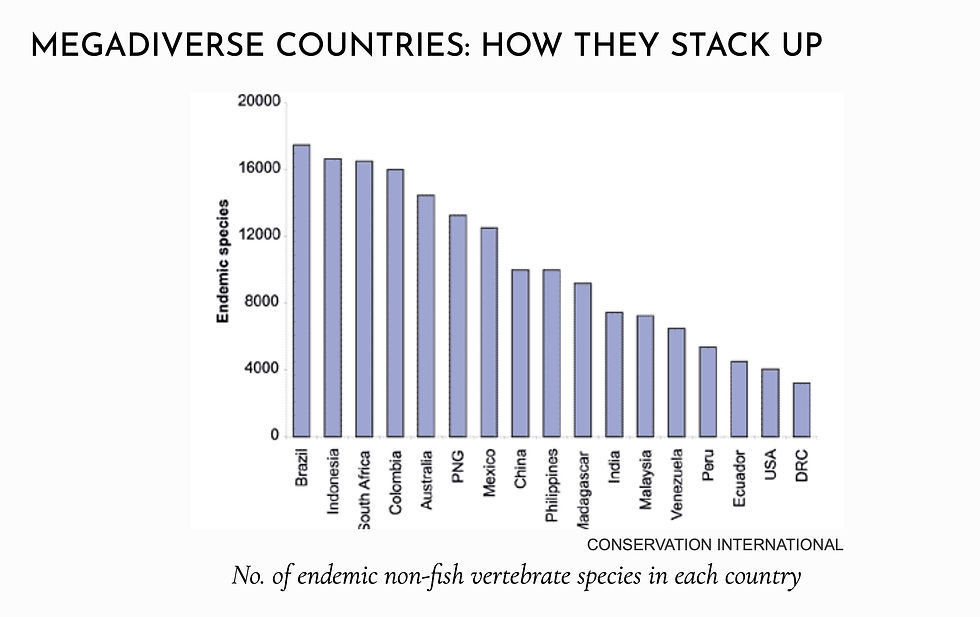The Economic Perspective 06/07/2024
- gmiller855
- Jun 10, 2024
- 5 min read
The Latest Trending Economic, Environmental and Infrastructure News Curated for You by The Balmoral Group
The Balmoral Group provides practical, professional and precise Economics, Data Analytics, and Engineering Consulting services and is part of a globally integrated team.
Happy Friday!
Last week, The Balmoral Group's Valerie Seidel, Laila Racevskis, and Amy Bainbridge attended the Natural Capital Symposium in San Fransisco. This symposium featured the international convening of government, finance, private sector, research institutions, and civil society leaders that are pioneering natural capital solutions and transforming the world through green, inclusive development which focuses on integrating natural capital approaches in policy and investment decisions.
In this edition of the Economic Perspective, we feature articles on clean water scarcity, how big-tech companies' data centers are being powered, challenges our oceans are facing, US manufacturing, and more. World Environment Day was also observed on June 5th, and for this edition's Data Visual, we highlight the megadiverse countries across the globe.
We hope you enjoy the read and let us know what you think! Please feel free to forward this to anyone you think would be interested. If you’d like to view previous editions please click here, or to subscribe please click here!
Thank you and have a great weekend!

Southern States Boost US Manufacturing Construction
According to the Commerce Department, the 12-month value of US construction put in place for manufacturing facilities totaled $18.4 billion through April 2024, of which factory construction in southern states accounted for about 66%. Further, the Census Bureau estimates that manufacturing now accounts for 13% of all non-government construction, the highest share on record. Federal funding is expected to continue supporting domestic investment in semiconductor, memory chips, and other critical component manufacturing through the CHIPS and Science Act. Read More

Study Finds Clean Water Scarcity Under-reported
A new study finds that while access to water is well often reported on, the quality of accessible water is not given as equal of representation in studies. Clean water is critical to human survival in not just drinking, but also food production, sanitation, and energy, and the quality of accessible water is not as well conveyed. While access to water in quantity may be high, the study estimates that 55% of the global population currently lives in areas that experience a lack of clean water in at least one month per year, especially in the Global South. The study also emphasizes the inclusion of water quality as a metric in further water scarcity assessments, in order to create a more accurate picture of global access to clean water. Read more here

Big-Tech Clean Energy Consumption
A recent report from Wired showed big-tech companies such as Amazon, Meta, Google, and Microsoft’s current and planned usage of clean, renewable energy and the impacts worldwide from their massive data centers being constructed. These companies are planning to harvest huge amounts of accessible renewable energy options such as solar and wind farms to power the many large data centers across the world. In Europe, billions are being spent alone on construction and design of new AI infrastructure and data centers by these major companies, and the question is how to power them. Most are choosing renewable energy sources to power and cool their centers to meet intercompany goals of net-zero emissions by 2030 to 2040, but with limited renewable energy options available, big-tech are researching and funding for more options and new ideas in the field. Read more about the current news and more here.

Washington Shellfish Found to Contain Poison
This week, Washington State Department of Health officials warned residents not to harvest shellfish recreationally, as many have been found to contain a type of poison. The poison, named Paralytic Shellfish Poison, or PSP, has been found in shellfish harvested from Grey’s Harbor and Willapa Bay after a break-out of poisonings along the Oregon Coast prompted Washington State officials to begin an investigation. PSP is produced by harmful algae that shellfish eat, and which is retained within the shellfish and is transferred to humans via ingestion; the paralytic can cause tingling and numbness in the hands and feet, and in more severe cases, can cause respiratory distress and even death in high enough doses. Read more here and heree

Challenges Our Oceans Face, and What Can be Done to Solve Them
The sea faces many challenges today. The dependence of a healthy ocean and coastal environment is critical to survival for both people and birds. Among the challenges, for the planet's marine resources, scientists estimate that there is a 70 percent decline in seabirds since the early 1950s, or approximately 300 million fewer seabirds. Audubon is working to establish and expand the network of marine protected areas around the hemisphere. A network of researchers from Audubon’s Seabird Institute located at Hog Island is championing a living laboratory to understand how climate change impacts seabirds and fish. In addition, the Seabird institute has restored seabird nesting colonies for over 42,000 seabirds. Rachel Carson has described the sea as “a great teacher.” Read more here.

AC Too Expensive for Many Americans as Heat Waves Become More Regular
A report released this week from the National Energy Assistance Directors Association (NEADA), the group representing state energy officials, reveals that the average U.S. electric bill is estimated to reach $720 this summer, largely due to intensifying heat. The longer, hotter summer months are increasing the costs of cooling, and threaten to leave many, especially low-income populations, unable to afford air conditioning. Approximately 21 million households are behind in paying energy bills, amounting to over $20 billion in past-due payments. While most states bar power companies from disconnecting delinquent accounts during cold weather, only 17 prohibit disconnections during hot weather. NEADA is calling for more federal funding for programs to help low-income households pay energy bills and improve efficiencies. Scientific American

Chileans Transform Discarded Hair into Coastal Clean-up Tool
Matter of Trust Chile is using human and animal hair as a clean-up tool for oil and other pollutants around the country. Hair has a natural ability to collect oil out of water so Matter of Trust has been collecting hair from barber shops, dog groomers, and other sources to turn into a tool they call Petropelo. A single kilo of Petropelo can clean on average 5 liters of oils and other pollutants. Similar products are used to help retain soil moisture by reducing evaporation and lessening the need for irrigation. Read More.
Data Visualization of the Week
Megadiversity Across the Globe
World Environment Day is annually observed on June 5th to encourage action to protect and restore the earth, and to mark the occasion, the World Economic Forum features the 17 megadiverse countries, or the nations with extreme biodiversity. Biodiversity is essential in the global actions for natural defenses against greenhouse gases. Ecosystems with significant biodiversity are natural carbon sinks with animals, plants, and bacteria working together to support essentials including food, clean water, shelter and medicines. Megadiversity is measured where a minimum 5,000 plants occur naturally within a region's borders including its marine ecosystems and the chart below shows the 17 counties that comprise 70% of the world's biodiversity. Read more at the World Economic Forum about each country's statistics qualifying them for their megadiverse status.
Interested in additional biodiversity news? The World Economic Forum also recently highlighted 6 rediscovered species, which are species that have been lost to science for at least 10 years but sometimes hundreds. Interestingly, the Giant Bee, with a wing span up to 2.5 inches (6cm), hadn't been seen since 1981 but was rediscovered in 2019.
Image Credit: Conservation International



Comentarios